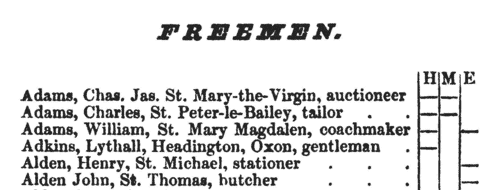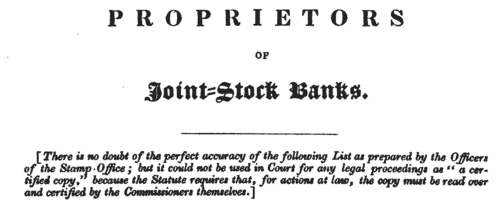Grubb Surname Ancestry ResultsOur indexes 1000-1999 include entries for the spelling 'grubb'. In the period you have requested, we have the following 386 records (displaying 181 to 190): Single Surname Subscription | | | Buying all 386 results of this search individually would cost £2,194.00. But you can have free access to all 386 records for a year, to view, to save and print, for £100. Save £2,094.00. More... |
These sample scans are from the original record. You will get scans of the full pages or articles where the surname you searched for has been found. Your web browser may prevent the sample windows from opening; in this case please change your browser settings to allow pop-up windows from this site. Non-Freemen Voters in Oxford: St Ebbe
(1837)
A poll of the freemen and non-freemen electors of the City of Oxford took place on 25 July 1837, the candidates being William Hughes Hughes (H), Donald Maclean (M) and William Erle (E). This poll book lists all 2145 voters, as well as those electors who did not vote. In both cases, the lists are divided into a single register of freemen, and then the non-freemen arranged by parish or ward - All Saints, Cowley, Holywell, St Aldate, St Clement, St Ebbe, St Giles, St John, St Martin, St Mary Magdalen, St Mary the Virgin, St Michael, St Peter in the East, St Peter le Bailey, and St Thomas. The votes of those who voted are shown on the right hand side of the page. The names of the freemen are given with address and occupation; those of non-freemen with address, but without stating occupation.GRUBB. Cost: £4.00.  | Sample scan, click to enlarge

| Shareholders of the North and South Wales Bank
(1838)
The provincial banks of England and Wales made annual returns to the Stamp Office of their proprietors or shareholders. These returns, registered in March 1838, from the 103 banks then in existence, contain the full names and addresses of nearly 30,000 shareholders.GRUBB. Cost: £6.00.  | Sample scan, click to enlarge

| British Army administration
(1841)
The British Army of queen Victoria's time had a very extensive system of administration. The Royal Kalendar lists officials, both uniformed and civilian, from the Commander-in-Chief's Office at Horse Guards, the Adjutant-General's Office, the Recruiting Department, the Quarter Master-General's Office, the Judge Advocate-General's Office, the Consolidated Board of General Officers, the Cinque Ports, the War Office, the Office of her Majesty's Paymaster-General, the Ordnance Department (including the out-ports and stations at Woolwich, Chatham, Dover, Portsmouth, Devonport, Guernsey, Jersey, Chester and Liverpool, Carlisle, Hull, Landguard Fort and Harwich, Alderne, the gunpowder manufactory at Waltham Abbey, the gunpowder magazines at Hyde Park, Purfleet, Gravesend and Tilbury, Upnor Castle, Priddy's Hard, Tipner Point, Keyham Point, Marchwood and Tynemouth; at Edinburgh, Stirling Castle and Fort George in Scotland; in Antigua, Australia, the Bahamas, Barbadoes, Berbice, Bermuda, Cape of Good Hope, Colombo, Corfu, Demerara, Dominica, Gibraltar, Grenada, Halifax (Nova Scotia), Jamaica, Isle aux Nois, Kingston (Upper Canada), Malta, Mauritius, Montreal, New Brunswick, Prince Edward's Island, Quebec, Rideau Canal, Ottawa Canals, St Christopher, St Helena, St Lucia, St Vincent's, Santa Maura, Sierra Leone, Toronto, Tobago, Trincomalee, Trinidad and Zante), the Royal Military College at Sandhurst, the Royal Hospital at Chelsea, the Royal Military Asylum at Chelsea and Southampton, Army Agents, General Agents for the Recruiting Service, and Army general staff and governors of forts and garrisons in Ireland.GRUBB. Cost: £6.00.  | Sample scan, click to enlarge

| Dissolutions of Partnerships
(1841)
Trade partnerships dissolved, or the removal of one partner from a partnership of several traders, in England and Wales
GRUBB. Cost: £6.00.  | Sample scan, click to enlarge

| Freemen of the city of Oxford
(1841)
A parliamentary poll of the freemen and electors of the City of Oxford was taken 30 June 1841, the candidates being Donald Maclean (Mac), James Haughton Langston (Lan) and Neill Malcolm (Mal). The poll book records the names, addresses and occupations of the householders, district by district, as well as the names of the freemen of the city, and shows for whom they voted.GRUBB. Cost: £6.00.  | Sample scan, click to enlarge

|  London Policemen
(1830-1842) London Policemen
(1830-1842)
The Metropolitan Police Register of Joiners (MEPO 333/4) lists policemen joining the force through to 31 December 1842 (to warrant number 19892). The register is alphabetical, in so far as the recruits are listed chronologically grouped under first letter of surname. It is evidently a continuation of a similar earlier register, not closed until its alphabetical sections were filled: consequently, there are no entries in this register for the initial letters N, O, Q, U, V, X, Y or Z; and the sections of this register start at different dates - A 18 April 1840 (warrant number 16894); B 11 December 1830 (5570); C 7 September 1830 (4988); D 27 May 1833 (8445); E 15 December 1838 (14476); F 30 March 1832 (7372); G 1 December 1835 (11,184); H 25 April 1832 (7457); I and J 13 February 1837 (12449); K 2 January 1838 (13457); L 3 October 1834 (9905); M 15 November 1832 (7999); P 4 October 1831 (6869); R 4 September 1837 (13021); S 30 March 1835 (10366); T 6 April 1840 (16829); W 30 December 1833 (9096). The register gives Date of Appointment, Name, Number of Warrant, Cause of Removal from Force (resigned, dismissed, promoted or died), and Date of Removal. Although the register was closed for new entrants at the end of 1842, the details of removals were always recorded, some being twenty or more years later. Those recruits not formerly in the police, the army, or some government department, were required to provide (normally) at least two letters of recommendation from persons of standing, and details of these are entered on the facing pages: the names in these are indexed separately - this index refers only to the police constables. Where a recruit was only recently arrived in the metropolis, the names and addresses of the recommenders can be invaluable for tracing where he came from.GRUBB. Cost: £8.00.  | Sample scan, click to enlarge

|  Persons of standing recommending London police recruits
(1830-1842) Persons of standing recommending London police recruits
(1830-1842)
The Metropolitan Police Register of Joiners (MEPO 333/4) lists policemen joining the force through to 31 December 1842 (to warrant number 19892). The register is alphabetical, in so far as the recruits are listed chronologically grouped under first letter of surname. It is evidently a continuation of a similar earlier register, not closed until its alphabetical sections were filled: consequently, there are no entries in this register for the initial letters N, O, Q, U, V, X, Y or Z; and the sections of this register start at different dates - A 18 April 1840 (warrant number 16894); B 11 December 1830 (5570); C 7 September 1830 (4988); D 27 May 1833 (8445); E 15 December 1838 (14476); F 30 March 1832 (7372); G 1 December 1835 (11,184); H 25 April 1832 (7457); I and J 13 February 1837 (12449); K 2 January 1838 (13457); L 3 October 1834 (9905); M 15 November 1832 (7999); P 4 October 1831 (6869); R 4 September 1837 (13021); S 30 March 1835 (10366); T 6 April 1840 (16829); W 30 December 1833 (9096). The register gives Date of Appointment, Name, Number of Warrant, Cause of Removal from Force (resigned, dismissed, promoted or died), and Date of Removal. Those recruits not formerly in the police, the army, or some government department, were required to provide (normally) at least two letters of recommendation from persons of standing, and details of these are entered on the facing pages: the names in these are indexed here (the police recruits are indexed separately and not included here). Recruits transferred from other forces or rejoining the force did not normally need recommendations - in the latter case, former warrant numbers are given - but some recommendations are from police inspectors, even other constables. Recruits coming from the army sometimes have general military certificates of good conduct, but most often have a letter from their former commanding officer; recruits recommended by government departments (most often the Home Office) similarly have letters from the head of department. But the great majority of the names and addresses in these pages are of respectable citizens having some sort of personal acquaintance with the recruit. Where more than two recommendations were provided, the clerk would only record one or two, with the words 'and others'. Tradesmen are sometimes identified as such by their occupations; there are some gentry. Although the great bulk of these names are from London and the home counties, a scattering are from further afield throughout Britain and Ireland. GRUBB. Cost: £8.00.  | Sample scan, click to enlarge

| Bankrupts' Assignees
(1842)
Assignees of bankrupts' estates (usually principal creditors and/or close relatives of the bankrupt) in England and WalesGRUBB. Cost: £6.00.  | Sample scan, click to enlarge

| North Tipperary Jurors: Clonmel
(1842)
'Names of the petty jury to try between our Sovereign Lady (Queen Victoria) and the Traversers, at a Special Commission of Oyer and Terminer and General Gaol Delivery, held at Clonmel, in and for the County of Tipperary, on Tuesday the 28th day of June 1842'. The list gives: full name; parish or place of abode; and occupation (such as esquire, gentleman, or merchant). GRUBB. Cost: £6.00.  | Sample scan, click to enlarge

| Trustees and Solicitors
(1843)
Trustees appointed to take over bankrupts' estates in England and Wales, and their solicitors. Trustees are often friends or relatives of the bankrupt: and/or principal creditors
GRUBB. Cost: £6.00.  | Sample scan, click to enlarge

|
Research your ancestry, family history, genealogy and one-name study by direct access to original records and archives indexed by surname.
|













